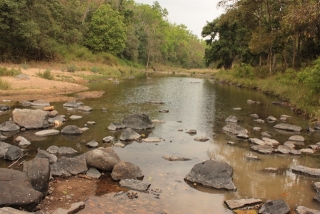
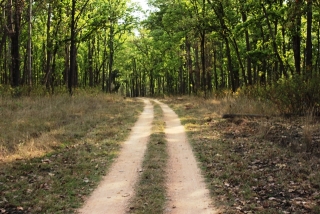
Kanha National Park, Madhya Pradesh
Driving to Kanha from Nagpur, one notices the change in the landscape. The 250 km. drive begins with a stretch of some rather intimidating trucker territory. The road is awful and you're bound to see some horrifying lorry accidents as you start climbing the ghats. Madhya Pradesh has many tiger reserves - Pench National Park is quite close to the Maharashtra-Madhya Pradesh border, and then of course there is Bandavgarh, one of India's better known reserves frequently featured on National Geographic. About 150 km. from Kanha, the almost non-existent road turns into a state-of-the-art three lane highway that is symbolic of the prosperity that Kanha and other reserves in the state have generated.
The people of Kanha are courteous and quite well educated on the ecology and the need to preserve it, from the hotel staff to the safari guides and forest rangers. The National Park seems to have created an ecosystem around it that allows it to thrive. It was heartening to see the people of Kanha taking real ownership of their home and displaying nothing but the utmost respect and a certain reverence for the forest and its inhabitants.
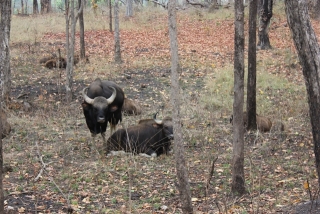
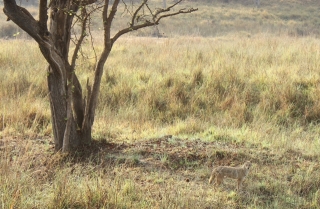
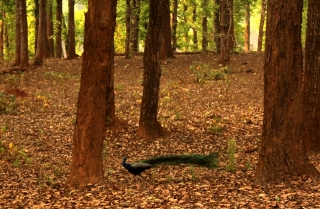
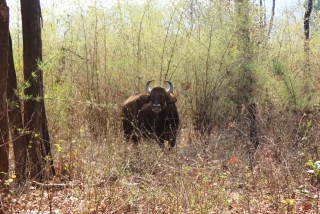
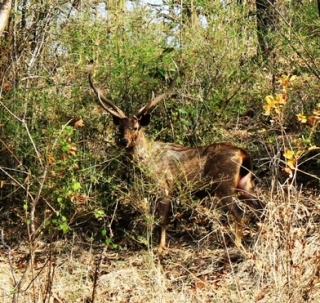
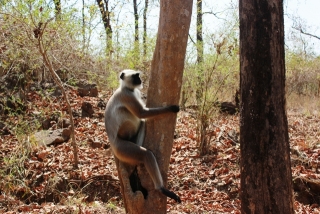

A saddening observation, but one that really shouldn't surprise us any more, was the lack of awareness and courtesy displayed by some of the other tourists. Kanha has strict rules and regulations because it is a National Park - nobody is allowed to alight from the safari jeeps once inside the reserve, unless it is in a designated pit stop. Yet one family forced their driver to stop because a passenger had to attend to nature's call; they completely disregarded the safari guide and driver who pleaded with them not to alight from the jeep. It is this ignorance and lack of awareness on the part of educated middle class Indians with disposable incomes that disappoints the few of us who actually believe in following rules.
The safari guides and drivers are mostly tribals who have lived in Kanha for generations; if their jeep is caught by the forest rangers because a passenger got down in the forest, their jeep is confiscated by the authorities and they are slapped with a fine. This means they earn nothing for the 8 days that their jeep is seized for. It is unfair to gamble with others' livelihoods just because you think you can. More than that, it is unacceptable to treat such a beautiful forest reserve with such disrespect when our country is rapidly losing whatever little ecology we have left.
In spite of all this, and despite the fact that this is the dry, arid heart of central India, this part of Madhya Pradesh does not seem to face water scarcity. Most hand pumps seem to be in working condition, and the sight of people fetching water from open wells and hand pumps was a common one. Talking to some of the local people revealed that the State Government seems to have done quite a bit in terms of water harvesting and conservation.

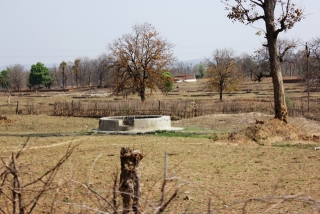
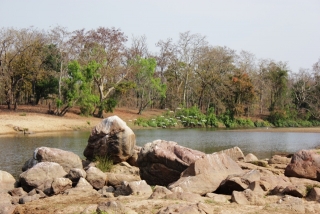
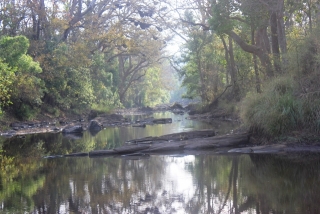
On this particular long weekend, hordes of tourists descended on the area from neighbouring Maharashtra and other states. Because of the crowds there were very few tiger sightings, and many of the real wildlife enthusiasts who are clearly distinguishable from the "family tourist" types were disappointed. However these are wild tigers, and we had to accept that we had not come to a zoo - this was their home and they were bound to shy away from the crowds of people.
However, what resulted from this particular situation was the fact that some visitors thought they could use their “influence” to see a wild tiger. Many tourists were bumped off the pre-booked safaris at the last minute because some influential people had made a few calls to local MLA’s. The park was closed one morning to all tourists because some sort of delegation with high security had arrived. It was unclear who these people were – whether they were from the government or just wealthy Indians was a mystery. To top it all, there was an option available to tourists keen on seeing the famed Royal Bengal Tiger, to take a “Tiger Safari”.
On further probing, we discovered that this so called Tiger Safari was not really a safari. The forest rangers of Kanha have 8-10 tame elephants within the sanctuary. For this Tiger Safari, they round up these elephants whenever there has been a tiger sighting somewhere in the reserve. The elephants take tourists on their backs to the place where the tiger has been spotted, and literally corner the tiger by surrounding it. Some of the tigers in Kanha seem to be used to this, and just sit down in the middle of the circle of elephants until they retreat. Others, especially the few female tigers with cubs have been known to retaliate.
The whole thing sounded completely unethical, but it was evident that the expectations of tourists outweigh the pristine beauty of Kanha and the efforts of the locals to preserve it in its natural splendor. This was the really sad part of the trip, and one that spoke volumes of the kind of society we live in, where we can’t even respect the fact that our national animal is an endangered species and that our fast dwindling forests are meant to be preserved.
The statistics say it all: at the start of the 20th century, India had approximately 40,000 wild tigers. Today, we have less than 1,400. And it’s not just about the tiger – Kanha is also home to the leopard and the sloth bear, both fascinating animals in their own right but far more reclusive and not as infamous as the tiger. One can only hope that these disappointments don’t win in the face of true efforts to maintain and preserve India's fantastic forests, wildlife and ecology.













